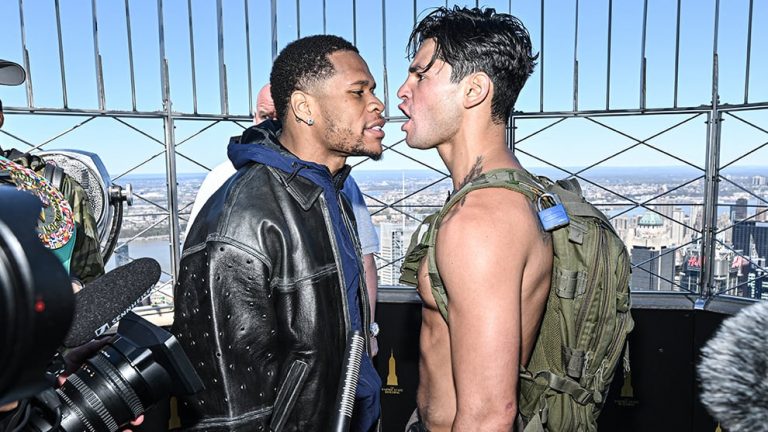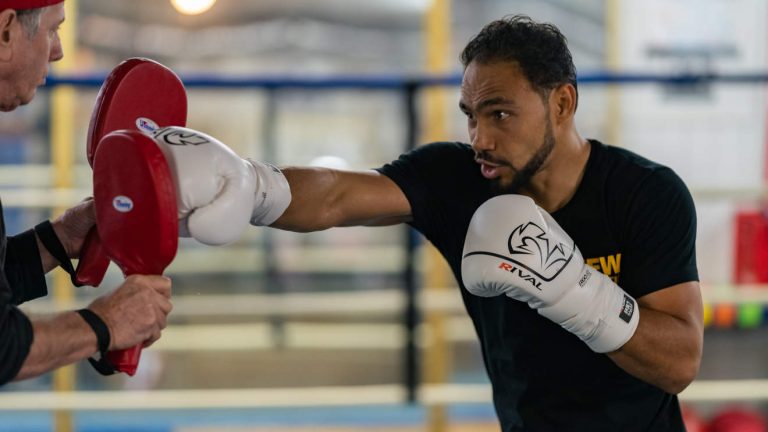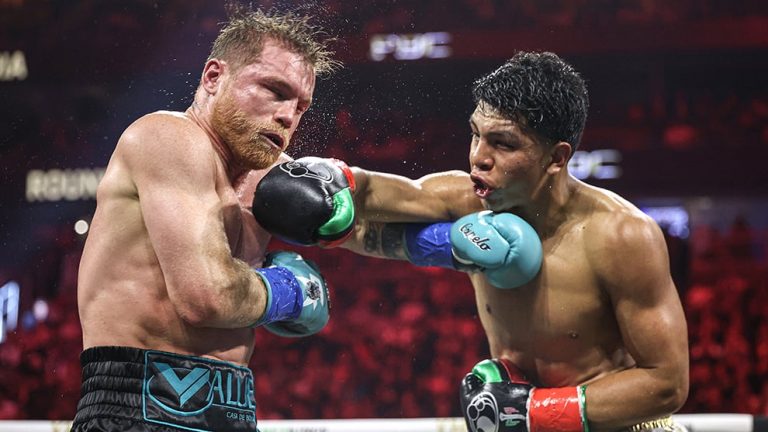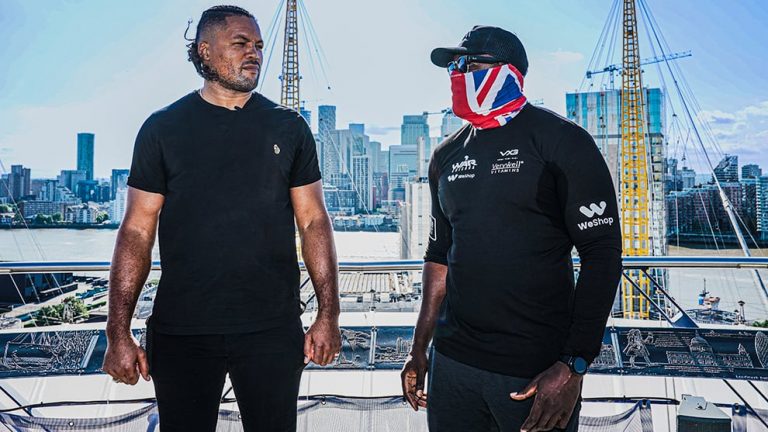Close Encounters: What is it like to be ringside on fight night?
THE notion of being ‘ringside’, particularly at a big stadium fight, can be a falsehood. Doctors, judges, trainers, timekeepers and inspectors are generally the only ones who can really claim to be immediately beside the ring – with the lead broadcasters’ commentary team generally close enough too. However, the Boxing News reporter is usually in a privileged position, if not always strictly where your ringside byline insinuates you were.
When representing BN efforts are made to be in our seat before the sound of the opening bell. This involves: Not being late, working out where the media entrance is, successfully identifying yourself to the person manning the accreditation desk, having your bag checked, navigating a winding corridor or two, and hoping that the burly security guard blocking the route to the seats on the ground floor has been briefed on the media seating situation.
“You’re in what area?” burly security guard asks as you show your wristband and attempt to explain that you’re kind of a big deal.
“I’m in area B, ground floor, row two, media.”
“What I think you need to do is go back down that way,” burly security guard says while pointing in the opposite direction to where you know you need to be, which is just behind his right shoulder. “Go up those stairs, through the double doors at the top, keep walking until you see the burger stand, turn left and keep going until you pass the gents, get in the lift on your right, go to floor six, ask for Benny, he’s a lovely bloke, and he’ll be able to show you to your seat.”
“Gotcha.”
Eventually, once the journey is complete and you’ve unpacked your laptop, notebook, and pen, being at ‘ringside’ is nearly always worth the effort.
The sounds of the punches are amplified, sometimes to gruesome proportions. You can hear the boxers’ grunts and groans get louder as the fight progresses, the pleas of the trainers grow ever more desperate and you tend to notice a cut or bruise much earlier than when watching on television. The atmosphere down on the floor is like no other and the sense of admiration, for the intricacies of the fighters’ talents and what they put themselves through, can become almost jarring. And, best of all, you might even get the boxing reporter’s ultimate memento: a drop or two of blood on your notebook.
I remember one such incident in June 2010 at York Hall – a venue when you really can be ringside and where finding one’s seat is significantly simpler – when I sat with my former BN colleague John Dennen at a Steve Goodwin show that, looking back at it on paper, may seem a somewhat unremarkable card. Consisting of five four-threes and three six-twos, all of which were matched with victory in mind for the home fighter, it was the kind of affair that a pup reporter must regularly endure as a rite of passage.
There were, quite unexpectedly for such a card, three tremendous battles. During one of them, blood erupted from a gash in Danny Dontchev’s forehead and landed with a splash on mine, staining my glasses on the way. Another was the last only time I have seen ‘nobbins’ – an old-school practice in which coins are thrown into the ring by the crowd in appreciation of the action – accompany a closing bell after a rousing draw between Chris Brophy and John “The Don” Brennan (I’m still unsure if the still active Brennan’s nickname is a nod to a particularly psychotic 1980s character from Coronation Street). The third encounter that sticks in my mind was Ryan Clark, a journeyman I would later get to know well, give prospect Michael Norgrove hell before being pipped on the scorecard. During those bouts I distinctly remember being taken with the loneliness of fighting and the act of violence on such a stage curiously haunting to witness from up close.
A less remarkable fight on that bill exhibited another intimacy one very occasionally experiences at ringside: a fighter who smells like they haven’t washed for weeks. I wondered at the time if the nauseating stench was designed to disturb his opponent in the same way it was disturbing me. The bout was a woeful affair and, as Mr Dennen observed, “really stunk the joint out.”
York Hall nonetheless remains one of the best places to watch boxing but, unlike bigger venues, wherever you sit or stand in that place is not hugely dissimilar to sitting on the ring apron. In the unlikely event you’re reading this and still haven’t experienced that wondrous Bethnal Green venue, make it a priority.
There is a certain camaraderie at the bigger events among the media. Some like to keep themselves to themselves and focus on the action and the job at hand. Some will check that they’re reading the fight correctly and ask how you scored a round, after every round. Others, often those a little less familiar with the experience, provide a running commentary throughout the evening, attempt to prove their knowhow by pointing out when one trained boxer should be using his right hand to exploit another trained boxer’s weaknesses, and their failure to contain such wisdom can quickly become grating. Sometimes, however, fights will be so thrilling that even the most seasoned operators fail to keep a lid on their emotions. The astonishing Anthony Joshua-Wladmir Klitschko scrap being a case in point. When Joshua went down in the sixth, the air was littered with f-bombs as practically everyone lost their s**t.
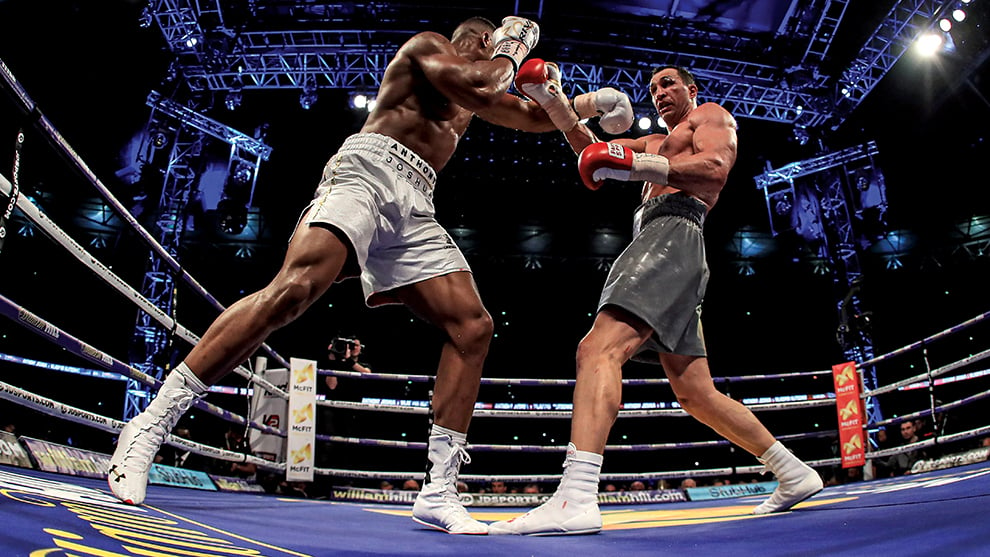
Joshua and Klitschko during their fight at Wembley Stadium on April 29, 2017 in London, England (Richard Heathcote/Getty Images)
It was drummed into me early that Boxing News must always be impartial. So even if the fighter you interviewed last week is doing the business in the ring, one with whom something of a rapport has been built, it’s a huge no-no to cheer. There are times, however, when it feels almost rude not to show some form of appreciation for the efforts put forth in front of your eyes. In September 2010, when Ricky Burns emerged from an early crisis to take the fight to big pre-fight favourite Roman Martinez inside a cauldron-like Kelvin Hall in Glasgow, I suddenly found myself on my feet without any memory of standing up. Sometimes, fights will just get you like that.
Perhaps the most difficult aspect of being a reporter at ringside is knowing when to take notes or do some typing, if writing a live blog or crafting an ‘on the whistle’ report. In the early days, the desire to record every noteworthy blow often meant I had nine or 10 pages of notes for a contest that would only end up as a paragraph in the report. Today, it pays to have a notebook at hand, and some form of shorthand up your sleeve, so you can scribble the odd note without taking your eyes off the action and then make more considered observations during the minute-break.
It is not, however, an exact science. If any print journo tells you they’ve never missed the punch that caused a knockdown, because they’ve momentarily got eyes on their copy, you are well within your rights to call them a fibber. I have asked countless times, and been asked countless times, “Was that a left or right hand?” That, perhaps, is one reason why those who sit at ringside in the press seats and later scream blue murder because they don’t agree with the judges’ verdicts should quieten down a touch.
Yet we’ve all been known to find certain scores truly perplexing. Though it is as common for the media to agree on one winner in a close fight as it is for the opinion to be split down the middle, now and again you’re in a stark minority of one. It certainly felt like that while being ringside – well, four or five rows back – for the first Andre Ward-Sergey Kovalev bout when I made the mistake of telling the American reporter to my right that, like two of the judges, I thought Ward was the worthy victor. Not only did he immediately react like I was making a case for the world being flat, he implored his pals to treat me with similar disgust. “Get a load of this idiot,” he guffawed.
It’s thankfully rare to have such obnoxious company. It is at ringside where one can learn a great deal from the experience of others and, between fights, if ever lucky enough to be next to someone who’s been there and done it, take the time to listen should they want to talk. Some of my most treasured conversations with journalists and broadcasters like Thomas Hauser, Donald McRae, Larry Merchant, Steve Bunce, Jim Lampley, Mike Costello, Colin Hart, Ron Lewis, Kevin Mitchell, Alan Hubbard, Ed Robinson, Graham Houston and Jack Obermayer, took place next to a prize ring. That hallowed area is where secrets are leaked and conversations with boxers and trainers alike, as they leave the ring in delight or dismay, can provide the most enlightening lines in a report. It is also where lifelong friendships, thanks to that boxing kinship, can be formed.
Yet it’s what happens in the ring that will always be the most important. Never forget that, at any moment, you might be about to witness something magical. Ward was one of the most impressive fighters I’ve been lucky enough to see up close. Floyd Mayweather was another. Those times watching Mayweather go about his business was a joy. And there is always something special about watching a showdown in Las Vegas after a long fight week. The sense of anticipation during the ring walks is hard to describe, particularly when one of the fighters struts past in such close proximity that the urge to initiate a fist bump is a struggle to resist.
One of my favourite experiences at ringside occurred down in the Madison Square Garden Theatre in New York as a peak Vasiliy Lomachenko removed Guillermo Rigondeaux’s heart with all the precision of a surgeon. Thanks to Jack Hirsch pulling some strings, my accreditation had been approved late in the day. Consequently, I was on a makeshift desk, close to the ring, with far more space to spread out than usual. So mesmerising was the beatdown and so alert was I to every second of it, the fight felt like pure theatre. In fact, my recollection of that contest differs greatly from all the rest – whereas being ringside is often a shared experience given how many are crammed in, watching King Loma in full flow felt so intimate that night, it was only mine.
Life is built almost exclusively on memories of the past and thoughts of the future with the present so fleeting it’s almost impossible to savour. Yet when ringside – or even four or five rows back – the intoxicating sensation of living in the moment is never more pronounced.

